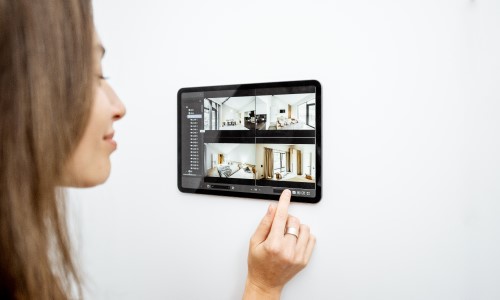
3.22.22 – SSI – Jennifer Kent
DIY providers such as Ring and SimpliSafe made security systems more accessible to certain market segments, while also pressuring professional companies to launch DIY solutions of their own.
The uncertainty and anxiety of the pandemic circumstances have fueled consumer demand for peace-of-mind products, and companies that positioned themselves to deliver security how consumers wanted to receive it — largely DIY and with attached services — have seen dramatic growth.
New entrants are offering products and services at rock-bottom prices, and all competitors are introducing innovative features and value-added services to differentiate and drive up ARPU.
DIY systems began their significant growth in 2015, offering customers an easier way to acquire a security system. In addition, systems like SimpliSafe offer multiple smart home devices and easy to use and install systems. Reluctance to invite professional installers into the home during the pandemic further increased self-install. Parks Associates’ research reveals that 42% of security system owners report that their system was self-installed.
Ring Alarm and SimpliSafe are leaders in DIY security systems. However, share for Ring and SimpliSafe has dropped since 2019, while big players in the pro-install space, like ADT, Brinks, and Comcast have all launched DIY options.
DIY system purchases are much more likely to be triggered by security events. Additionally, the firm reports that 49% of DIY system owners report that they purchased their home security system due to a burglary at their home or the home of a loved one — compared to just 27% of professionally installed system owners.
DIY systems may be reaching a new customer segment living in neighborhoods with higher crime rates. Notably, income levels are relatively even between DIY and pro-install owners.
Professionally monitored security systems are more likely to have professional installation than self-installation. With that said, the difference is narrowing.
When considering just the security systems purchased in the prior 12 months, self-install surpassed professionally installed in 2019. Professionally install bottomed out in Q2 2020 during the strictest economic shutdowns and social distancing measures, but has since rebounded.
The rise in attached video cameras and other smart home devices will support the long-term need for professional installs for many consumers. In fact, some security providers who started as DIY offerings, like Ring, now offer pro-install services.

Disruption of DIY in Residential Security
Overall, the home security market is highly fragmented with relatively few national players; regional dealers occupy the mid-market and approximately 13,000-15,000 local independent dealers constitute the balance of the market. DIY security solutions have the potential to impact this portion of the market in the longer term, as self-installed systems offer monitoring services at lower prices than professionally installed systems.
Lower priced monitoring fee alternatives make segments of this market vulnerable to erosion by self-installed systems. Similarly, self-installed systems have the potential to reduce acquisition costs by eliminating installation cost and replacing it with less expensive support services.
From the security industry perspective, smart products and DIY systems are woefully inadequate substitutes for a professionally installed and monitored security system. From a consumer perspective, smart products and DIY systems make them feel safe and provide peace-of-mind, and for the price, the shortcomings of these products presented by the pro-install industry fall behind.
The research firm finds that 46% of self-installers state that keeping their home safe was a main purchase driver for the purchase of their security system. Only 14% of self-installed system owners report that their system came from a security dealer; the majority cite their system is from an online or national/local retailer.
Consumer demand for safety and security has long been considered a persistent driver through any market conditions. Security firms need to continue to innovate and to pivot messaging to emphasize DIY options and professional installation to provide consumers the choice they seek in home safety solutions.
While many believe a professional technician installing a security system is critical to consumer perceptions of safety, there is a new generation of solutions helping to expand the market. Regardless of installation, 90% of security system owners want professional monitoring.
Further information on this topic can be found in Parks Associates’ quantified consumer report, “Security Buyers: Purchase Trends and Triggers,” which quantifies the security buyer journey, including drivers and barriers, influencers, purchase channel preferences for product and service bundles, purchase processes, and importance of incentives, such as discounts, financing, or rebates from an insurance provider.
Jennifer Kent is Vice President of Research for Parks Associates. Join the firm at the upcoming executive conference, CONNECTIONS: The Premier Connected Home Conference. This in-person event will take place at the Omni Hotel in Frisco, Texas May 17-19, 2022. The event will cover smart home devices, home systems, privacy and security, broadband services and so much more. Register for the event online at https://parksassociates.com/events/connections-us
SSI has partnered with Parks Associates for the creation of DIY FYI, a column designed to help dealers keep track of important smart home market developments, what the competition is and whether they want to jump into something they see as a new opportunity.
